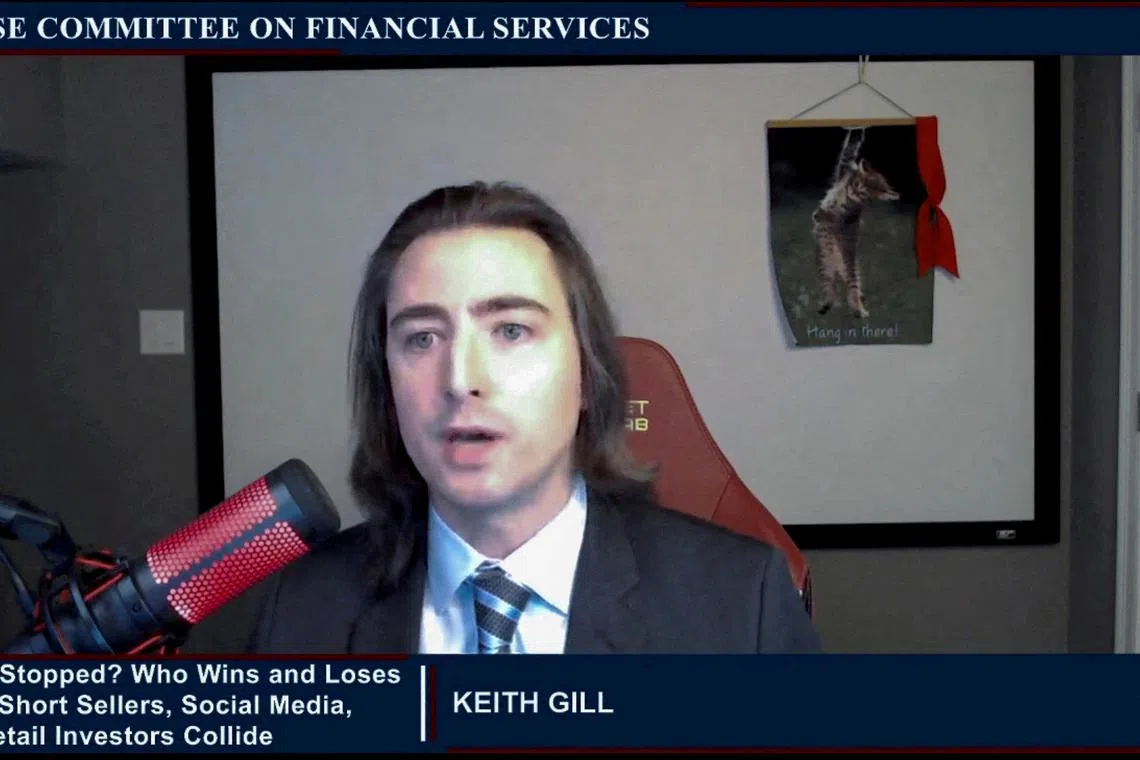As GameStop revives meme stock rally, questions arise of market manipulation
Sign up now: Get ST's newsletters delivered to your inbox

Over two weeks, trading influencer Keith Gill posted images of a massive stake in GameStop and its call options.
PHOTO: REUTERS
Follow topic:
New York – As a renewed bout of GameStop fever gripped the meme-stock faithful, fans of trading influencer Keith Gill waited for one moment: the day their hero, aka “Roaring Kitty”, would become a billionaire.
The notion was hardly far-fetched. Over the course of two weeks, Mr Gill had been posting images of a massive stake in GameStop and its call options in a portfolio that peaked at more than US$550 million (S$744 million) on June 6. Though he has added even more stock since then, the dollar value of his holdings has dropped along with the company’s shares.
With the stock little changed since the early days of its latest mania, a new kind of anxiety is building among Wall Street and retail traders alike.
The original 2021 GameStop rally shook the idea of short selling to its core – eroding the appeal of betting against a floundering company when you can wind up feeling the wrath of Redditors. This time around, the existential question is about what counts as market manipulation.
Does posting a meme, potentially delivering an instant profit, violate the spirit of free and fair markets? Has the David versus Goliath nature of meme stocks shifted? What if Roaring Kitty is the Goliath? And how exactly did he build a position bigger than Charles Schwab’s?
“The original meme stock craze was us versus them, with ‘them’ being the guys who would short-sell millennials’ favourite companies like GameStop,” said Mr Steve Sosnick, chief strategist at Interactive Brokers. “But I’m not sure who ‘them’ is any more.”
The populist ringleader of a short squeeze that shook Wall Street in the original 2021 meme-stock rally, Mr Gill is losing his folksy charm, at least for some followers. Trading firms and even some former fans are eyeing him with more suspicion, as Redditors pose questions like: “How is Roaring Kitty coming back not a basic pump-and-dump scheme?”
By June 13, Mr Gill’s brokerage account snapshots suggested he had unwound an earlier position of 120,000 call options and added more GameStop, upping his portfolio to about nine million shares of the video game retailer, worth more than US$262 million.
As his actions sent the price soaring again, GameStop seized on the volatility to sell more than US$2 billion worth of stock.
All told, anyone who bought shares over the past month and held was about as likely to lose money as to profit. To some, one major difference is that hedge funds and other sophisticated investors have adapted from three years ago and are likely to come out ahead – at the expense of Mr Gill’s retail-trading fans.
“Some of the quantitative managers have models to look at the trends in price and those models are extremely quick to get out of the stock if they see significant downside volatility,” said Mr Don Steinbrugge, chief executive of Agecroft Partners, which helps hedge funds raise money. “At some point, retail investors are going to wise up and realise there’s a lot of danger.”
The episode brought to the fore questions of what constitutes market manipulation. The Wall Street Journal reported Morgan Stanley-owned brokerage E*Trade was considering barring Mr Gill from its platform over such concerns, after previously banning other popular personalities like Mr Dave Portnoy, the Barstool Sports founder who streams as Davey Day Trader and said he got kicked off the brokerage.
To be sure, Mr Gill was accused of using his clout to manipulate prices even three years ago, when he first arrived on the public stage.
“Three years ago, this was funny,” said economics adjunct professor Peter Atwater of William & Mary university. “People have become more bothered by this than amused by it, and that to me is an indication that it is unlikely that this behaviour will be allowed to continue.” BLOOMBERG

